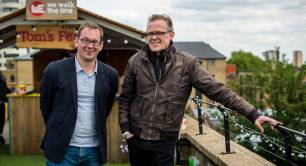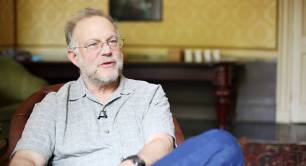SE100 Trailblazing Newcomer: Change Please
In early 2017, eight of the best social enterprises in the UK were honoured at the annual NatWest SE100 Social Business Awards. Change Please was named Trailblazing Newcomer after impressing the judges with solid growth and commitment to proving its impact.
We are all familiar with the phrase: “wake up and smell the coffee”, but few of us are brave enough to face up to the realities of a situation, never mind actually doing
something about it.
One-year-old social enterprise Change Please (CP) takes this idiom to a whole new level. CP is a coffee brand like no other, providing homeless people with housing, training, and a London living wage while they train to become fully-fledged baristas. The idea is beautifully simple: serve coffee that tastes good, and does good too.
With the support of The Big Issue, CP has empowered homeless people with the skills, equipment, and speciality beans they need to become certified baristas. By providing professional training and support alongside housing, bank accounts, occupational therapy and clinical psychology, CP gives those in need an opportunity to turn their lives around, all the while proving that people who are homeless are not hopeless.
Pioneers Post met one of CP’s beneficiaries, Marian, serving up cups of coffee and laughter to thirsty Londoners at his quirky Piaggio van at London Bridge. He tells us how he and his wife Lucy have both benefitted from CP’s invaluable work, with Lucy brightening up the days of miserable London commuters at Canary Wharf.
Founder Cemal Ezel explains: “We’re making the invisible visible, and we just want to prove that if you want to make a difference to the world, you just have to change where you buy your coffee.”
And with no other social enterprise or private organisation that immediately lifts people out of homelessness, it will come as no surprise that CP has been awarded the Trailblazing Newcomer Award. Despite the many charities and organisations supporting people that are homeless, CP’s model is truly innovative, immediately creating a self-sustainable cycle which puts people back onto their feet and into housing, all through the simple sale of coffee.
Our organisation is trailblazing because we focus on a job-first model
Cemal is keen to tell us more: “Our organisation is trailblazing because we focus on a job-first model and we tackle the issue of homelessness in a completely different way to what’s been done before.
"We’ve had a huge amount of growth in just over a year with a range of corporate accounts, with new locations, with a huge amount of press activity, and from marketing to sales to training new staff, everyone’s really pulled together within that year.
"The award itself is absolutely fantastic because it recognises organisations that have had a large social impact in a short space of time, making a real difference. And for us it’s recognition of the hard work the whole team has put into making a difference to people’s lives and gives us that courage and motivation to really push forward in the forthcoming years.”
Selling speciality coffees in the heart of London is only one of the ways that CP makes its money. The social enterprise does not depend on any grants or donations, but instead uses the growing demand of coffee to maintain a sustainable financial growth and business model: providing mobile coffee vans and experienced baristas for hire around the London area, as well as supplying coffee for cafes, restaurants, offices, and supermarkets.
SE100 judge Edward Finch, a partner in the charity and not-for-profit team at Buzzacott, commented: “One of the key things that impressed me about Change Please is that, as a social business offering a product like coffee, historically some of the products haven’t really been premium products that people would buy anyway, regardless of the social mission.
"Whereas this is coffee coming from a stand at the same quality that people are buying in nearby coffee shops that people are happy to buy on the street, but also that big companies are serving up in their canteens to their guests and visitors.”
And as if helping the homeless wasn’t enough, CP also has an ethical supply chain. By purchasing coffee from workers’ co-operatives, using solar or Ecotricity energy for its vans, equipped with 100% compostable cups, and selling its coffee grounds as biofuel, CP proves that organisations can be both environmentally and socially sustainable.



